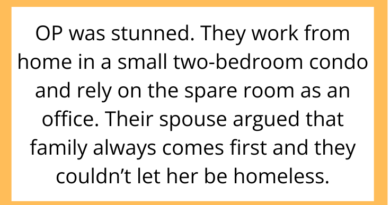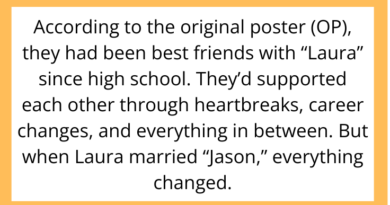AITAH for Telling My Best Friend She’s Ruining Her Life by Marrying Her Boyfriend?
Last night, I was scrolling through r/AITAH when I stumbled across a story that instantly made me pause. The poster asked if they were the bad guy for telling their lifelong best friend she was making the biggest mistake of her life by marrying someone they believed was manipulative and controlling.
This scenario hit a nerve with thousands of readers, igniting debates about loyalty, honesty, and whether it’s ever your place to interfere in someone else’s relationship. In this post, we’ll explore every angle—why so many commenters were divided, what makes these situations so complicated, and whether brutal honesty always makes you the villain.
Let’s dive in.
The Friendship That Sparked the Controversy

The original poster (OP) shared that they had been best friends with “Anna” for nearly 15 years. They’d seen each other through everything—college breakups, career changes, family losses. So when Anna announced she was getting married to her boyfriend of two years, OP expected to feel nothing but happiness.
Instead, OP confessed that they had deep reservations. The fiancé had a track record of belittling Anna in front of others, making snide comments about her weight, and controlling how much time she spent with friends.
After months of biting their tongue, OP finally snapped. During a lunch date, OP told Anna, “You’re ruining your life by marrying him. He treats you like trash, and everyone can see it.” Anna was shocked and left in tears.
Later, OP was bombarded with messages from mutual friends accusing them of overstepping and humiliating Anna. Others privately thanked OP for saying what no one else dared to.
Loyalty vs. Interference: Where’s the Line?

The Duty to Be Honest
Many people in the comments sided with OP, arguing that true friends don’t sit by silently when they see someone heading toward disaster. They felt OP was brave for speaking up, even at the cost of the friendship.
From this perspective, honesty—even painful honesty—can be the highest form of loyalty. The logic is simple: If you really love someone, you don’t let them walk into a situation that will break them.
One commenter shared, “I wish someone had said this to me before I married my ex. You did the right thing.”
The Right to Make Your Own Choices
On the other hand, a large number of readers believed OP crossed a major line. Even if the fiancé was a terrible partner, Anna had the right to make her own decisions—good or bad.
For these commenters, OP’s intervention felt paternalistic and disrespectful. By declaring Anna was “ruining her life,” OP put themselves in a position of superiority, implying Anna wasn’t capable of making her own choices.
One person summed it up perfectly: “Advice is fine. Ultimatums and condemnation are not.”
When Brutal Honesty Becomes Harmful

Intent vs. Impact
OP may have intended to protect Anna, but the way they delivered the message—publicly, emotionally, and without warning—felt more like an attack than concern.
Some readers pointed out that phrasing matters. Instead of saying, “You’re ruining your life,” OP could have expressed their worries gently:
-
“I’m worried about how he treats you.”
-
“I’ve noticed some patterns that seem unhealthy.”
-
“I care about you, and I’m here no matter what you decide.”
By framing the conversation as support rather than judgment, OP might have preserved the friendship while still sharing their perspective.
Respecting Boundaries

Another reason so many commenters were divided is that adults are allowed to make their own choices—even if those choices end badly. Part of respecting someone’s autonomy is recognizing that you can’t control their life, no matter how much you care.
One user wrote, “Sometimes the best thing you can do is be there to pick up the pieces, not prevent the break.”
Can You Save a Friendship After a Blow-Up?

After Anna left in tears, OP was consumed with guilt. They wondered if they’d lost their closest friend forever.
If you find yourself in a similar situation, here are a few steps that can help repair the relationship:
-
Apologize for the delivery, not the concern.
Acknowledge that your words were harsh, even if your intentions were good. -
Reaffirm your support.
Let your friend know you’ll be there regardless of what they decide. -
Give space.
Sometimes, the person needs time to process before they can talk again. -
Avoid “I told you so.”
If the relationship does fall apart later, resist the urge to say you were right. It rarely helps.
Final Thoughts

So, are you the bad guy for telling your best friend she’s ruining her life?
Maybe. Maybe not.
It depends on how you define friendship:
-
Is it absolute loyalty, no matter what?
-
Is it radical honesty, even when it hurts?
Most of the time, it’s a balance. You can love someone fiercely and still respect their right to make their own choices. You can offer support without ultimatums.


